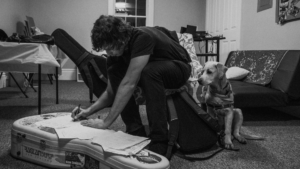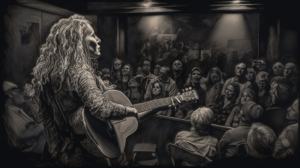Starting a career in folk music can be a rewarding and fulfilling experience, but it also comes with its own set of challenges. Here are the five primary challenges to starting a career in folk music and how to overcome them, along with supporting quotes from famous folk and indie artists:
Challenge 1: Limited Exposure
Folk musicians often face the challenge of limited exposure due to their unique position, where they’re not bound by the commercial pressures of mainstream music. As Ani DiFranco once said, “Folk music is not an industry. It’s a community. It’s about making connections and telling stories that matter.” To expand their reach and gain more exposure, consider:
Questions to ask yourself:
- What venues or events cater to my niche audience and book artists my audience appreciates?
- How can I use social media to find and target an ideal audience to promote my music?
- Are there any music festivals or competitions that I can participate in to gain more exposure?
Challenge 2: Limited Resources
Many folk musicians have limited resources, which can make it difficult to record, produce, and promote their music. They may not have access to expensive equipment or the financial resources to pay for studio time or marketing campaigns. Singer-songwriter Sufjan Stevens once said, “I like the idea of working within a set of limitations, whether it’s time or resources.” To overcome this challenge, consider:
- Exploring alternative recording options, such as home recording or collaborating with other musicians
- Applying for grants or crowdfunding campaigns to finance your music projects
- Networking with other musicians to share resources and knowledge
Challenge 3: Finding a Fan Base
Another challenge is finding a fan base interested in your niche music. Since your music is not mainstream, it may be difficult to find people who are interested in listening to it, and building a loyal fan base can take time and effort. As Mumford & Sons’ Marcus Mumford said, “We just make music that we love, and if other people love it too, then that’s great.” To build a strong fan base, consider:
- Creating a strong online presence to connect with potential fans
- Networking with other musicians and industry professionals to reach new audiences
- Offering exclusive content, merchandise, or experiences to engage and retain fans
Challenge 4: Standing Out from the Crowd
In niche music, there is often a lot of competition for a limited audience. This means that it can be challenging to stand out from the crowd and get noticed. To differentiate yourself from other musicians in your genre and offer something unique to your fans, consider:
- Defining your unique selling points and incorporating them into your brand
- Experimenting with different styles or instruments to create a distinct sound
- Collaborating with other artists to bring new perspectives to your music
Bon Iver’s Justin Vernon once said, “Part of being an artist is being able to be in the moment and figure out what you’re doing and where you’re at.” Use this mindset to help stand out from the crowd.
Challenge 5: Maintaining Motivation
It can be easy to get discouraged when starting a career in folk music. Since it can be difficult to get exposure and build a fan base, some musicians may feel like their efforts are not paying off. To stay motivated and continue to work hard, even when success is not immediate, consider:
- Setting realistic goals and celebrating small achievements along the way
- Connecting with other musicians for support and inspiration
- Reminding yourself of your passion for music and the reasons you started your career
As indie-folk musician José González said in his interview with PopMatters, “Stay curious and keep learning. The only way to stay motivated is to keep growing as an artist and constantly challenge yourself with new ideas.”
Independent artists in the folk and indie music scenes face a unique set of challenges as they strive to build successful careers. By recognizing these obstacles and learning from the experiences of established musicians, emerging artists can find innovative ways to overcome limited exposure, limited resources, finding a fan base, standing out from the crowd, and maintaining motivation. Embracing these challenges and finding creative solutions will ultimately lead to a stronger and more vibrant music community, where independent artists can thrive and share their unique talents with the world.








